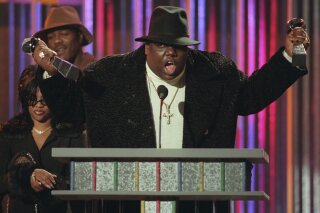Today in History: March 9, The Notorious B.I.G. is shot and killed at 24

FILE - Notorious B.I.G accepts rap artist and rap single of the year during the Billboard Music Awards, Dec. 6, 1995, in New York. (AP Photo/Mark Lennihan, File)
Today in History:
On March 9, 1997, rapper The Notorious B.I.G. (Christopher Wallace) was killed in a still-unsolved drive-by shooting in Los Angeles at age 24.
On this date:
In 1796, the future emperor of the French, Napoleon Bonaparte, married Josephine de Beauharnais (boh-ahr-NAY’). (The couple later divorced.)
In 1841, the U.S. Supreme Court, in United States v. The Amistad, ruled 7-1 in favor of a group of illegally enslaved Africans who were captured off the U.S. coast after seizing control of a Spanish schooner, La Amistad; the justices ruled that the Africans should be set free.
In 1862, during the Civil War, the ironclads USS Monitor and CSS Virginia (formerly USS Merrimac) clashed for five hours to a draw at Hampton Roads, Virginia.
In 1916, more than 400 Mexican raiders led by Pancho Villa (VEE’-uh) attacked Columbus, New Mexico, killing 18 Americans. During the First World War, Germany declared war on Portugal.
In 1933, Congress, called into special session by President Franklin D. Roosevelt, began its “hundred days” of enacting New Deal legislation.
In 1945, during World War II, U.S. B-29 bombers began launching incendiary bomb attacks against Tokyo, resulting in an estimated 100,000 deaths.
In 1964, the U.S. Supreme Court, in New York Times Co. v. Sullivan, raised the standard for public officials to prove they’d been libeled in their official capacity by news organizations.
In 1976, a cable car in the Italian ski resort of Cavalese fell some 700 feet to the ground when a supporting line snapped, killing 43 people.
In 1987, Chrysler Corp. announced it had agreed to buy the financially ailing American Motors Corp.
In 1989, the Senate rejected President George H.W. Bush’s nomination of John Tower to be defense secretary by a vote of 53-47. (The next day, Bush tapped Wyoming Rep. Dick Cheney, who went on to win unanimous Senate approval.)
In 2000, John McCain suspended his presidential campaign, conceding the Republican nomination to George W. Bush. Bill Bradley ended his presidential bid, conceding the Democratic nomination to Vice President Al Gore.
In 2018, Martin Shkreli, the former pharmaceutical CEO who’d been vilified for jacking up the price of a lifesaving drug, was sentenced in New York to seven years in prison for securities fraud.
In 2020, global stock markets and oil prices plunged, reflecting mounting alarm over the impact of the coronavirus. An alarmingly sharp slide at the opening bell on Wall Street triggered the first automatic halt in trading in more than two decades; the Dow industrials finished nearly 8% lower.
In 2021, Buckingham Palace said allegations of racism made earlier in the week by Prince Harry and Meghan, the Duchess of Sussex, were “concerning” and would be addressed privately by the royal family.
In 2022, a Russian airstrike devastated a maternity hospital in the besieged Ukrainian port city of Mariupol and wounded at least 17 people.
